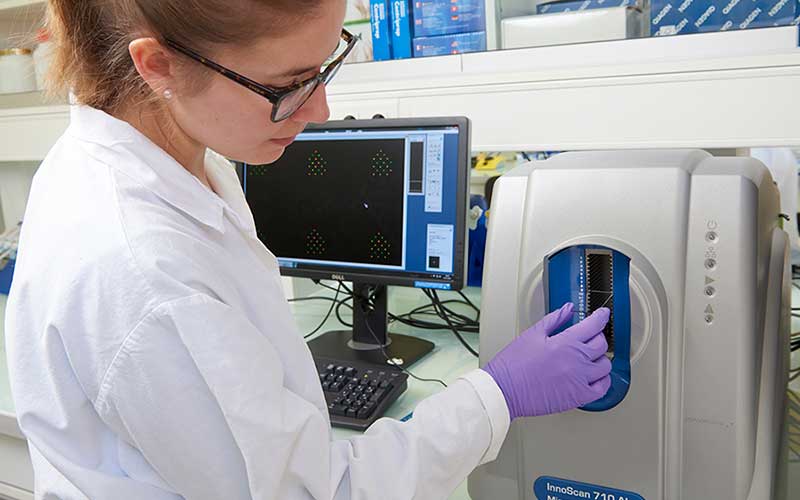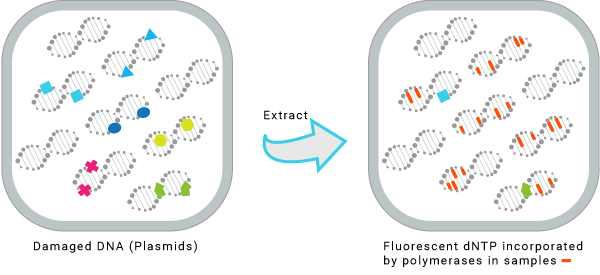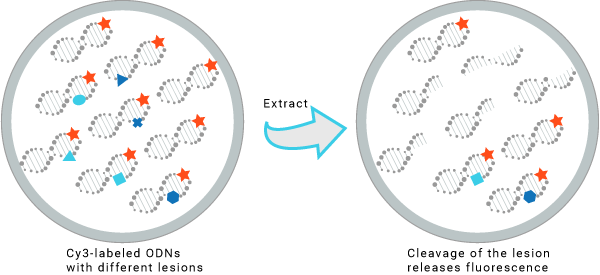Products
The SPOT-LX™ Platform
Functional Multiplex Repair assays
- Glyco-SPOT: quantification or Glycosylase and AP endonuclease activity
(from Base Excision Repair pathway), - ExSy-SPOT: quantification of Excision/Synthesis Repair activities
(from Base Excision Repair, Nucleotide Excision Repair and Intra Cross-Link repair pathways), - Next-SPOT: quantification of Double-Strand Break Repair.
The only comprehensive DSB repair assay (HR, NHEJ, SSA, alt-EJ — MMEJ).

Principle
All assays are based on the same principle.
Series of DNA substrates containing specific lesions are immobilized on biochips. Extracts prepared from the samples to be characterized are applied on the biochip. The sample's DNA Repair enzymes repair their different substrates and generate fluorescent changes on the biochip yielding a specific Signature for each sample.
Fluorescence is quantified using a scanner.
Assay characteristics
Standardized, Fast, Powerful assays on biochip
- Standardized and controlled manufacturing processes
- Positive controls included on-chip
- Internal quality controls for the repair reaction
- Standardized data analysis processes
- Assays are fast and easy-to-use
Multiplexing:
analyzing multiple targets in a single reaction volume
It has several advantages:
- Saves times
- Uses limited sample volumes
- Increases sample throughput
Characterizing the whole DNA repair network
Combined with bioinformatic analysis, the SPOT-LX™ platform provides a powerful method to gain insights into DNA Repair regulation by upstream signaling networks and to identify the drivers activating specific pathways and the functional consequences of mutations in DNA repair and DDR genes.
Suitable Samples
Preclinical and clinical models
LXRepair assays can characterize DNA repair activities in most living tissues or cells.
DNA Repair activities are measurable in any cell- or tissue-type, provided live cells are present. The DNA Repair profile varies depending on the cell type and the tissue of origin.
DNA Repair activities can also be characterized in tumor biopsies, 3D models, organoids.
Cell and tissue extracts
Nuclear or whole-cell extracts can be used.
DNA Repair activities are measurable in as few as 20.000 cells (carcinoma cell line).
Assays description
ExSy-SPOT
Multiplex Excision/Synthesis Repair Assay

Lesions present on the biochip
AP sites
EthenoA
Glycols
Cisplatin Adducts
Several versions of the assay exist to specifically investigate the following:
- excision/synthesis repair
- excision
- polymerase efficiency and fidelity
Applications
- Investigation of DNA Repair and DNA Damage Response
- Functional network characterization
- Impact of genotoxic compounds
- DNA Repair inhibitors' mechanisms of action
- Polymerase properties
- DNA Repair inhibitor characterization
- DNA Repair inhibitor screening
Glyco-SPOT
Multiplex oligonucleotide Cleavage Assay

Lesions present on the biochip
A/8oxoG (MYH)
Hypoxanthine/T (AAG/MPG)
Thymine glycol /A (NTH – NEIL)
U/A (UNG)
U/G (SMUG)
EthenoA/T (AAG/MPG)
Abasic site (APE1)
Applications
- Characterization of DNA Repair inhibitors
- Screening DNA Repair inhibitors
- Analysis of defenses against oxidative stress
- Inflammation studies
- Aging studies
- Investigation of neutraceutical properties
Ordering information:
Next-SPOT
Service
Service

Biomarker identification
We provide biomarker research as a paying service.
LXRepair can run DNA Repair assays using customer's own sample materials (cells, biopsies) and provide the original data as well as detailed reports summarizing the results. We help you design the experiments and interpret the results.
Mentoring is provided for biotech and pharmaceutical companies for their drug development programs, from preclinical to clinical stages.
Our experienced laboratory engineers and scientific experts will work closely with you to determine your specific needs and develop customized solutions.
On request, specific protocols can be provided to help customers prepare appropriate extracts from their own sample materials.
Screening Assay Service
Screening assays can be set up using LXRepair technologies to help you to identify effective DNA repair inhibitors.
The Glyco-SPOT assay is directly transferable to external screening platforms.
Partnership
Partnership

Diagnostic Development


We are seeking strategic partners in the pharmaceutical or diagnostic industry to discover new biomarkers and develop diagnostic or companion diagnostic kits using our proprietary technologies.
Our first-in-class assays complement existing genomics profiling by providing functional information and allowing the impact of genomic modifications on protein functions to be assessed.
If you are interested in exploring a strategic partnership with us, we would be happy to hear from you.
R&D partnership

As an SME, LXRepair is eligible for EU funding for innovative collaborative research projects.
